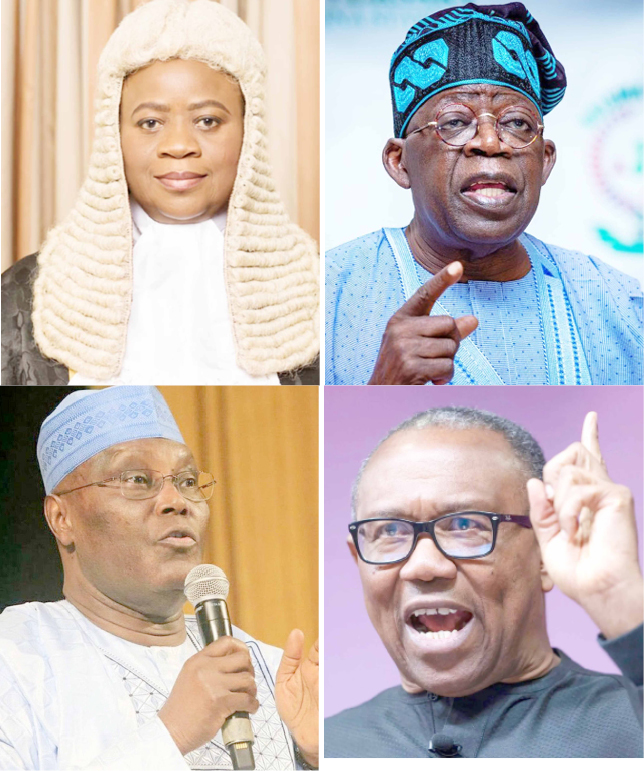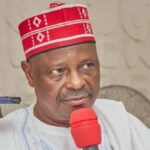The first week of hearing at the Presidential Election Petitions Tribunal was characterised by several applications and decisions that surprised observers, Daily on Trust Sunday reports
Among these applications are withdrawals by two political parties, the one for live broadcasting by two political parties, the objections to fresh issues raised in the petition and the agreement to harmonise issues to be relied on.
Following the May 8 inaugural sitting of the tribunal, which had Stephen Adah, Bolaji Yusuf, Moses Ugo and Abba Mohammed as members, the presiding justice, Simon Tsammani, spoke against sensationalism and use of technicalities to delay the proceedings lawyers in the matter had set about dealing with the business of the day.
Shortly after the inauguration, one of the five political parties that have filed petitions challenging the outcome of the February 25 presidential elections, the Action Alliance (AA), among the Allied Peoples Party (APP), the Labour Party (LP), Allied People’s Movement (APM) and the Peoples Democratic Party (PDP), applied to withdraw its petition.
- First week of hearing: Motions, objections, withdrawals shape presidential tribunal
- UNICAL girls target success at world universities games in China
The LP presidential candidate, Peter Obi and Governor Simon Lalong attended the inaugural sitting. The tribunal, however, refused the latter’s representation of Tinubu because he (Tinubu) is not a corporate entity.
Governor Lalong admitted that he would stand in for the APC when the panel pointed out why he could not represent Tinubu.
To the surprise of observers, the AA had fielded two presidential candidates in David Solomon Okonigbuan and Hamza Al Mustapha for the election, although it was the name of the former that featured in the petition seeking to nullify the election of the All Progressives Congress (APC’s) Bola Tinubu.
Thus, two lawyers, Oba Maduabuchi, a Senior Advocate of Nigeria (SAN) and Malachy Nwaekpe, both announced their appearances for the AA and claimed to have been instructed by different factions of the political party to withdraw the petition.
After considering the crux of their applications, Justice Tsammani dismissed their petition, citing the provisions of the Electoral Act, 2022.
Again, on May 10, the Action Peoples Party (APP) withdrew the petition against the election of Tinubu and the tribunal went on to dismiss the petition.
The five-member panel of justices, on Wednesday, dismissed the matter after the party announced its withdrawal of the petition.
Many observers were surprised with the withdrawal as the counsel to the APP, Obed Agu, who did not give reasons for the withdrawal, had on the previous sitting asked Tinubu and the APC to concede the election to save the tribunal the weight of evidence he and the party had against them.
Motions for live broadcast
At the proceedings on May 11, Atiku’s lead counsel, Chris Uche (SAN), informed the tribunal that he had served the motion seeking live broadcast of the proceedings.
The application sought “An order directing the court’s registry and parties on modalities for admission of media practitioners and equipment into the courtroom.”
He further contended that the application for live broadcast of the tribunal’s proceedings was backed by the Nigerian constitution, as well as that the matters of the 2023 general elections were of national concern and public interest.
Similarly, LP’s Peter Obi brought a motion through his lead counsel, Levi Uzoukwu (SAN), seeking live broadcast of the proceedings on the grounds that they are of public interest.
Objections over fresh issues
On May 9, the APC informed the tribunal of the service of motions to be determined at the pre-hearing stage seeking to strike out paragraphs of Atiku’s petition against Tinubu’s election and for the dismissal of the petition in its entirety.
In the first motion brought by his counsel, Lateef Fagbemi (SAN), Tinubu is seeking to strike out some paragraphs in Atiku’s petition, where he raised fresh issues while replying to his preliminary objection.
Atiku had contended that Tinubu did not meet the constitutional threshold and is constitutionally disabled from contesting for the office of the president of the Federal Republic of Nigeria because he forfeited a sum of $460,000 “as substituted by a competent authority, sequel to a compromise agreement and for narcotics- related crime (proceeds of crime) in the United States District Court, Northern District of Illinois Eastern Division, Judge A. Nordberg.”
Atiku also claimed that Tinubu failed to disclose in his form EC9 that he holds dual citizenship of Nigeria and Guinea, having voluntarily acquired the citizenship of the Republic of Guinea.
Atiku had further submitted that the grounds on non-qualification is competent, being a constitutional issue.
Tinubu, in his second motion, also sought the tribunal to dismiss the entire petition seeking the nullification of the election for being a breach of the Electoral Act, 2022, filed by Atiku at the pre-hearing stage for being incompetent.
On May 11 when the motions were billed for hearing, the PDP presidential candidate, Atiku Abubakar, stormed the tribunal alongside former governors of Adamawa, Cross River and Niger states, Jibrilla Bindow, Liyel Imoke and Babangida Aliyu respectively; acting national chairman of the PDP, Umar Iliya Damagun, former chairman, Uche Secondus; governorship candidate in Kogi State, Dino Melaye, and PDP chieftain, Raymond Dokpesi, among others.
The APM’s suit has garnered more interest from observers of the election tribunal as the party and its presidential candidate are seeking the disqualification of Tinubu and his running mate, Kashim Shettima.
Tinubu and APC had since informed the tribunal that they filed motions seeking to dismiss the petition by the APM challenging his election at the pre-hearing stage for failing to disclose any cause of action.
At the resumed hearing on May 9, Fagbemi said the APM’s petition was worthless and disclosed no reasonable cause of action, maintaining that it has no leg upon which to stand.
In its petition, the APM is contending that Tinubu was not qualified to contest the 2023 presidential election because he did not have a validly nominated running mate.
The APM contends that Shettima was still the nominated senatorial candidate of the APC for Borno Central senatorial district at the date he was nominated as the vice presidential candidate on July 14, 2022.
The party argues that despite withdrawing his senatorial candidacy on July 15, 2022, he had breached Electoral Act, 2022 via double or multiple nomination.
The APM and its presidential candidate, Chichi Ojei, also contended that the election was marred by widespread irregularities.
The parties in this petition, which include the Independent Electoral Commission (INEC), Tinubu, Shettima, Masari and the APC, announced that they had answered the pre-hearing questions contained in Form TF 008 over the APM petition.
The APM petition is among the petitions now slated for hearing on May 18, alongside the PDP and LP, who all agreed to streamline the issues that are non-contentious and would not be objected to during the main hearing.
With the withdrawal and dismissal of the petitions of two out of the three petitions, there are now three petitions left at the tribunal, namely CA/PEPC/02/2023, Peter Obi and Labour Party versus INEC, Bola Tinubu, Kashim Shettima and the APC; CA/PECP/04/2023 Allied Peoples Movement versus INEC, APC, Tinubu, Shettima and Masari; and CA/PEPC/05/2023 Atiku Abubakar and PDP versus INEC, Tinubu and APC.

 Join Daily Trust WhatsApp Community For Quick Access To News and Happenings Around You.
Join Daily Trust WhatsApp Community For Quick Access To News and Happenings Around You.


